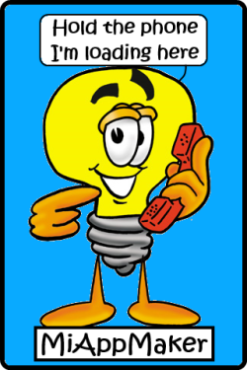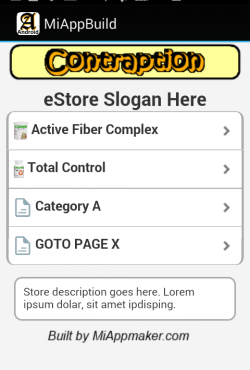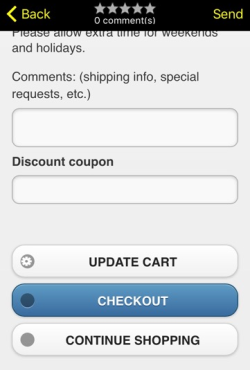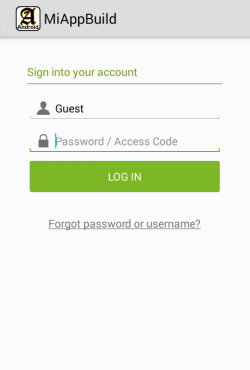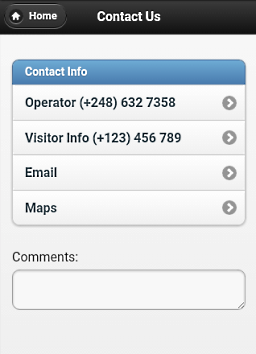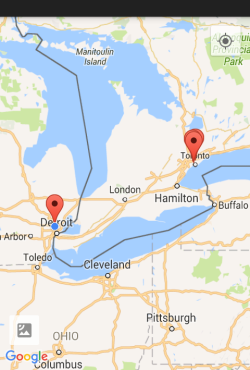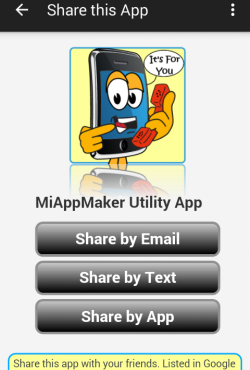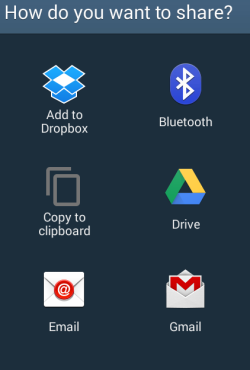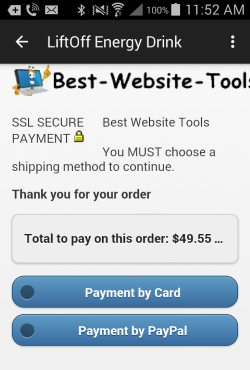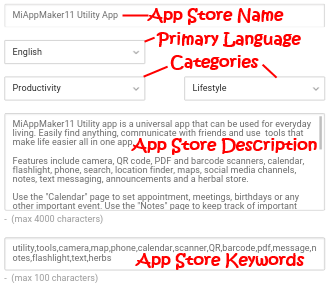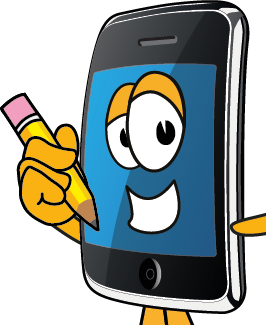Mobile App Tutorial For Beginners
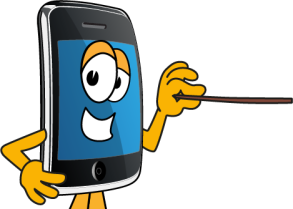
How to use this tutorial. Important! We set up an accordion box pattern to help organize the material. To open or close the panels click Read more/less (Note: this function requires javascript be enabled)
The red arrows on the right side indicate which sections are expandable. Click anywhere in the control section will open or close the collapsed content box.
Mobile App Tutorial Q and A
What is a mobile app?
A mobile app is a small program designed to work on a mobile device i.e. SmartPhones and tablets. Read more/lessIn 2007 Apple Inc. unveiled the first iPhone moble device. This is revolutionary in that it is the first time cell phone and Internet technology were combined. In 2008 Google jumped onboard with the first Android smartphone. At this point the advancement of mobile app technology went into hyperdrive.
In July 2008 the Apple App Store was launched. Followed in October 2008 by the Google Play App Store. Which started the mobile app making industry in earnest. Then anyone could create and publish an app. Soon other companies like Amazon and Microsoft got into the business with their own versions of smartphone, tablet and App Store.
A mobile app is technically speaking a collection of digital programs that perform a function while displaying information through a mobile user interface. Realistically a mobile app is a tool or a game used on a mobile device. Native apps are those that are embedded in the device by the manufacturer. Subsequent applications are called third party apps.
Native Apps include the cell phone, GPS technology, bluetooth, and browser technology that comes with the device. Other native apps may include but aren't limited to the camera and text messaging. Legally speaking third party apps need to ask the user for permission to access some of the native app functions.
For instance; an app may want to access the GPS function so the app asks for permission from the user before the app can be downloaded from an App Store. These permissions are necessary to help protect the user from fraud (and the publisher from liability and litigation).
How does a mobile app make money?
A mobile app can be sold, sell products or consult for business. Read more/lessThere are five ways to earn money with a mobile app.
- Sell the app for a cost in the App Stores.
- Advertising inside the app, such as with AdMob or RevMob.
- In-App-Purchases where the app sells a product.
- Charge a subscription fee on a recurring basis.
- You can use an app to drive traffic to your other businesses or entice your audience to spend money at your place of business.
Apps can be thought of as tools that people use to solve a problem or answer a question. Your knowledge, products and services can be sold through a mobile app. You can even mix and match monetization schemes to maximize return on investment
In App Purchases (IAPs) are a way to sell digital products through the App Stores. Example: a plant care handbook sells for $3.99 from a link in the app but the app is free to download. The actual handbook resides in the app but access is only permitted after an in app purchase. Example 2; your app is a game with multiple levels, Each level up costs $0.99 to access. Example 3; You're a professional who wants to sell your knowledge. A client wants your advice so for $1.99 you review the request and answer her with your professional advice.The are 2 things about IAPs and they are that the App Stoes take 30% of the sale and they need approval by a review team before publishment. However they do cover taxes and currency exchange. IAPs feature world wide syndication and do the financial transaction, currency exchange and payments to you.
Third Party Transactions can be accomplished in serveral of the usual ways. Specifically credit card and PayPal. Many shopping carts support mobile transactions in the same way online shopping works. You can use a third party shopping cart to take orders for products sold by you or services performed by you offline.
Third party transactions typically come with bank (or PayPal) fees in the order of 1 - 3% plus a small transaction fee. You have to do any exporting yourself and you are responsible for taxes. But in the long run are much cheaper to do for the merchant than IAPs.
Is a mobile app right for my business?
You Bet! The beauty of a mobile app is that most people now carry a mobile device with them everywhere they go. Read more/lessUnlike a desktop computer where people have to be sitting in front of it, a mobile app can be accessed just about anywhere in the world. On the go, standing up, sitting down, laying about or couch potato people use their mobile devices everywhere.
A mobile app is different than a website in that it needs to be simple, fun and easy to use. A mobile app allows you to connect with your audience through their smartphones and tablets. Whether you are an online business or a brick and motor company an app can improve your connection with people.
The real question is 'how do I use a mobile app for MY business?' It all starts with an idea! Your app needs to do something or be entertaining. Think about what it is your business does. Then add that thought to the end of this sentence: "A mobile app could..."
You might be an author or an artist who wants to release their work to a world wide audience. You might be a professional and want people to know more about your skills and talent. You could be an online soloprenuer or website builder that wants to reach the mobile marketplace. No matter who you are a mobile app can work for you and your business.
How do I start making a mobile app?
Creating a mobile app should be a simple process, but isn't. You start with a plan of action. Read more/lessIn your favorite note taking method write down what you think your app should do. This should contain the scope, concept and planning of the app. It can be a simple sentence or long multipage document. Then answer these 4 questions.
- Context - where will the product be used?
- Persona- who is the target market?
- Vision - How will the product be used?
- Budget - How much time and money are you willing to spend on design and development?
Next thing to do is figure out what your app will look like. This important step leads to establishing design requirements and general layout of your app. Visit our library of mobile app templates and see what others apps can do.
Take notes on what pages and functions you want included in your app. Keep in mind that your app can access other functions on mobile device like, phone, email, maps, and social media. You will want all the tools needed to make mobile apps all in one place. We hope you select MiAppMaker.com as your mobile app source.
What kinds of apps are there?
Apps can be designed for a several platforms i.e. iPhone, iPad, smartphone and tablet or designed to have one size fit all.Read more/less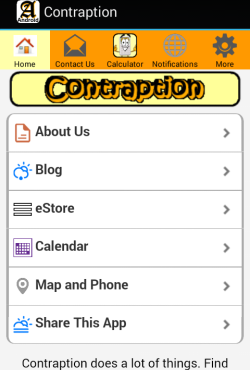
There are now 5 major app publishing methods you can publish in. They are:
- iOS for the Apple App Store. (iPhone and iPad)
- Googpe Play App Store. (smartphone and tablet)
- Amazon Kindle. (fKindle Fire tablets)
- Windows Phone Marketplace. (smartphone and tablet)
- Your own Web App hosted on your own website (desktop and laptops).
Most popular build method is for Android devices. Second is for Apple iPhone and iPad. Amazon Kindle is growing fast but has a smaller marketplace.
This is important because each platform should have the app to be built for it. You Can create a universal app that works on most platforms but there are drawbacks and limitations to doing it this way.
A universal app (one that works on all devices) can save cost and development time but the functionality might not be supported on all platforms. Developing an app for each platform takes longer and costs more but will be supported better in each platform.
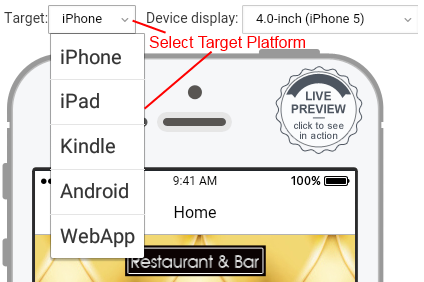
Your app creation tool should include everything from idea starting to publishing in the App Stores. Publishing is a lot more complicated than it appears on the surface. For instance Apple and Google require that you join their developer programs.
You can either become a developer yourself or hire a developer and publish on their account (recommended). Being a developer requires a lot more knowledge and computer skills than one might think.
What does it take to be an app devleloper?
Join the Apple or Google developer programs Read more/lessBecoming a mobile app developer is easy. Simply register at Google Play Developer or Apple Developer Program. These are not free to join but the cost is reaonable. Apple Wants $99.00USD/year. Google developer program is only $25.00USD/Forever.
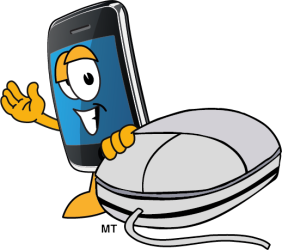
- HTML, CSS3 and Javascript programming languages.
- Graphic artist to make icons, backgrounds screenshots, images, etc
- Certified Apple and Google Mobile App Developer.
- Internet marketing skills
- Mobile App and Website development skills
There is a lot more to publishing than just submitting your app to the App Stores. With the amount of knowledge needed to know it is wiser to hire a developer who does most of the work for you.
What do I need to know before I can publish?
You need to make sure the app works as designed. Read more/lessTest Tip
Having an app previewer is a must for testing your app. Get a previewer for the mobile app builderIt is wise to go through your app page by page and make absolutely sure everything looks good and works correctly.
If your app fails this test it needs to be revised, fixed, re-submitted and re-reviewed. If you mess it up too many times in a row your app may never get accepted.
The review process can take from a couple of days to a couple weeks to complete depending on how busy the review team is. You should get a professional developer to check your app prior to submission (highly recommended).
When you submit your app to the app stores you must enter a contact email address. The review team(s) will contact you to let you know if you have issues with your app and to let you know when it is accepted and published.
You will need a lot of graphic art to accompany your mobile app during the submission process. You should have at a minimum (1) screenshot and (1) icon. The max number of screenshots you can submit vary from 1 to 8 for each screen size - phone, retina and tablet.
The more screenshots you have the better. You can have up to 18 similar icons for your app. But all the icons must be very similar to each other. You will need a Splash Screen to display while your app is loading. You will need to have a short AppName, a short and long description and a list of keywords.
You may need to get certain certificates for your app, like for age verification and rating, push notification and In-App-Purchases. You need to register an app id, and copyright it. You need to agree with and comply with each "Terms of Service" agreement. You need to submit banking and tax information.
Mobile App Business Idea Generator
Scan through the list to find a business like yours. Read more/less
Mobile App Tutorial Usage Tip
All the links open in a new window. You can follow along in the tutorial on one screen and operate the builder in another screen.What to do next. Start building! Register, login, select an app template, start modifying. I am here for you. Contact me for support.
That concludes the Mobile App Tutorial for Beginners. Get started now or continue reading the tutorials below.
See Also:
Mobile App Builder - tutorial teaches you how to begin making your own mobile app.
Mobile App Editor - tutorial teaches you how to use the editor to configure and modiy your app.
Mobile App Graphics - tutorial teaches you how to create icons for the App Stores.
Mobile App Previewer - tutorial teaches you how to use the previewers to test your mobile app.
Mobile App Publisher - tutorial teaches you how to use MiAppMakers publishing tools.
Home : Mobile Apps : Mobile App Tutorial
61 W. Annabelle Ave. Hazel Park,
MI. 48030-1103, U.S.A.
telephone: (248)546-0374
email: support@best-website-tools.com
© Copyright 2007-2026 All rights Reserved.
Sun: closed
Mon-Fri: 9:00AM to 6:00PM
Sat: 9AM-12:00PM
Closed Holidays
